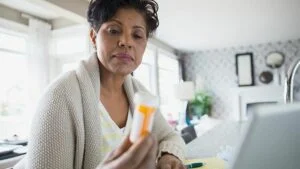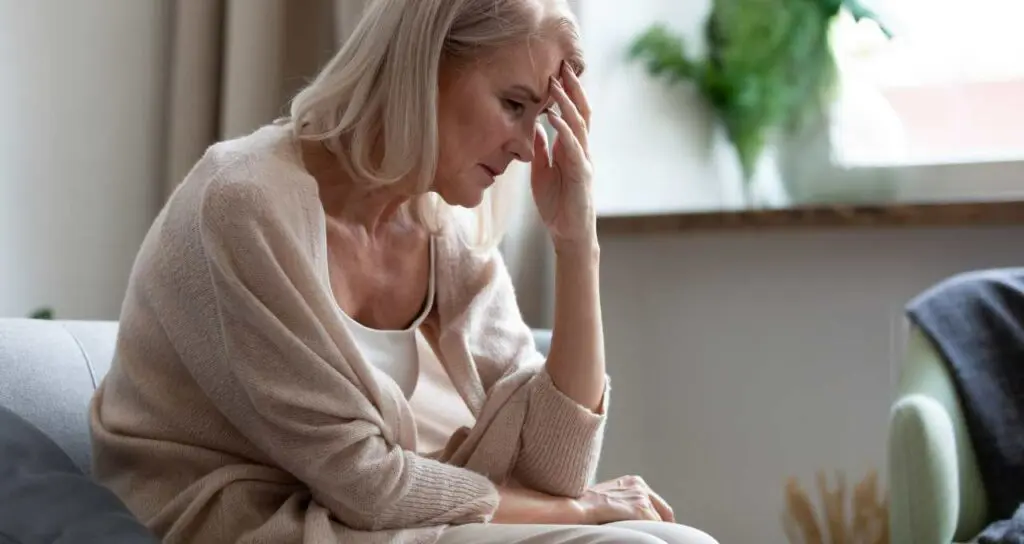Welcome to a crucial chapter in a woman’s life – menopause. As women transition through this natural phase, they often encounter a variety of symptoms that can significantly impact their quality of life. While hormonal treatments are commonly discussed, there exists a wealth of non-hormonal options that provide relief and support during postmenopause. In this blog, we will explore a diverse range of non-hormonal treatments of menopausal, offering insights and practical advice to help women navigate this transformative journey with confidence and comfort.
Contents
Why Consider Non-Hormonal Treatments For Menopausal?
 Considering non-hormonal treatments for menopausal is a significant and valid choice for several reasons. While hormonal therapies are commonly used to alleviate menopausal symptoms, some women may prefer or need alternatives due to various health concerns, personal preferences, or specific medical conditions. Here are key reasons to consider non-hormonal treatments for menopause symptoms:
Considering non-hormonal treatments for menopausal is a significant and valid choice for several reasons. While hormonal therapies are commonly used to alleviate menopausal symptoms, some women may prefer or need alternatives due to various health concerns, personal preferences, or specific medical conditions. Here are key reasons to consider non-hormonal treatments for menopause symptoms:
- Medical Concerns and Contraindications: Some women may have contraindications or medical conditions that make hormonal treatments unsuitable. Non-hormonal options offer a safer alternative for individuals with a history of breast cancer, blood clots, or other conditions where hormonal therapies might pose risks.
- Holistic and Natural Approaches: Many women prefer holistic and natural approaches to managing their health. Non-hormonal treatments often involve lifestyle modifications, herbal remedies, and mind-body practices, aligning with a holistic philosophy that focuses on the overall well-being of the individual.
- Minimizing Side Effects: Hormonal therapies can sometimes lead to side effects such as weight gain, mood swings, and breast tenderness. Non-hormonal options tend to have fewer side effects, providing a more comfortable experience for women seeking relief from menopausal symptoms.
- Long-Term Considerations: Some women may be hesitant about the long-term use of hormonal therapies and their potential impact on health. Non-hormonal treatments offer an alternative that can be sustained over the long term, promoting a sense of stability and predictability.
- Cultural and Ethical Preferences: Cultural or ethical beliefs may influence a woman’s choice of treatment. Non-hormonal options often align with a more naturalistic or integrative approach, providing a solution that fits within a person’s cultural or ethical framework.
Overall, considering non-hormonal treatments for menopausal provides women with a diverse range of options that can be tailored to their specific needs and preferences.
What Are The Examples Of Non-Hormonal Treatments For Menopausal?
Non-hormonal treatments for menopausal symptoms encompass a variety of approaches that focus on alleviating specific symptoms without the use of hormonal therapies. Here are some examples:
Lifestyle Modifications
- Dietary Changes: Menopausal women can benefit from adopting a diet rich in nutrients, including fruits, vegetables, and whole grains. These foods provide essential vitamins and minerals, supporting overall health and potentially mitigating symptoms such as fatigue and irritability. Additionally, maintaining a healthy weight through dietary choices can positively impact hormonal balance and reduce the severity of certain symptoms.
- Regular Exercise: Incorporating regular physical activity into a routine is key for managing menopausal symptoms. Exercise has been shown to reduce the frequency and intensity of hot flashes, enhance mood, and promote better sleep. Activities such as walking, swimming, or yoga are excellent choices, contributing to cardiovascular health and overall well-being.
- Smoking Cessation: Quitting smoking is particularly important during menopause, as smoking can exacerbate symptoms such as hot flashes and increase the risk of osteoporosis. Smoking cessation not only benefits respiratory health but also supports cardiovascular and hormonal health, promoting a smoother menopausal transition.
Herbal Remedies
- Black Cohosh: Black cohosh is a popular herbal remedy used by some women to alleviate hot flashes and night sweats. While research on its effectiveness is ongoing, some women report relief. However, caution is advised, and consulting with a healthcare professional is crucial, as herbal supplements can interact with medications and have varying effects on individuals.
- Soy and Phytoestrogens: Foods rich in soy, like tofu and soybeans, contain compounds called phytoestrogens that mimic the effects of estrogen in the body. Some women find relief from hot flashes and other symptoms by incorporating these foods into their diet. However, individual responses can vary, and it’s essential to maintain a balanced approach to soy consumption.
Vitamins and Supplements

- Calcium and Vitamin D: Adequate calcium and vitamin D intake are essential for maintaining bone health, particularly as estrogen levels decline during menopause. These nutrients support bone density and reduce the risk of osteoporosis. Supplements may be recommended, especially if dietary sources are insufficient. But it’s important not to exceed recommended dosages.
- Omega-3 Fatty Acids: Omega-3 fatty acids, found in fish oil, have anti-inflammatory properties that may help alleviate joint pain and mood disturbances associated with menopause. Including sources of omega-3 in the diet or taking supplements can contribute to overall well-being.
Mind-Body Practices
- Meditation and Mindfulness: Incorporating meditation and mindfulness practices into daily life can help manage stress, improve sleep, and reduce anxiety associated with menopausal symptoms. Mindful breathing exercises and guided meditations are valuable tools for promoting emotional well-being.
- Yoga: Regular practice of yoga offers physical and mental benefits during menopause. Yoga can improve flexibility, reduce joint pain, and enhance mood through a combination of gentle movements, stretching, and focused breathing exercises.
Acupuncture
Acupuncture is an alternative therapy that involves the insertion of thin needles into specific points of the body. Some menopausal women find relief from symptoms such as hot flashes, insomnia, and mood swings through acupuncture sessions. While research is ongoing, acupuncture is considered safe when performed by a trained practitioner and may be a valuable addition to a comprehensive treatment plan.
Cognitive Behavioral Therapy (CBT)
Cognitive Behavioral Therapy (CBT) is a psychotherapeutic approach that focuses on identifying and changing negative thought patterns and behaviors. For menopausal women, CBT can be particularly beneficial in managing emotional symptoms such as mood swings, anxiety, and depression. By addressing and restructuring negative thought processes, CBT empowers individuals to cope more effectively with the psychological aspects of menopause.
Cooling Strategies
Menopausal symptoms, especially hot flashes and night sweats, can be particularly disruptive to daily life. Cooling strategies involve practical measures to manage these symptoms. This can include using fans or air conditioning, wearing lightweight and breathable clothing, and employing cooling pillows or blankets. These simple yet effective strategies can enhance comfort and quality of life for women experiencing the warmth and discomfort associated with hot flashes.
Vaginal Moisturizers and Lubricants
Vaginal dryness and discomfort during intercourse are common concerns during menopause due to changes in estrogen levels. Non-hormonal solutions like vaginal moisturizers and lubricants provide relief from dryness and enhance comfort. Regular use of these products can contribute to improved sexual well-being and overall intimate health. It’s essential to choose products specifically designed for menopausal women and consult with a healthcare provider if needed.
Over-the-Counter Pain Relievers
Joint and muscle pain are common symptoms during menopause, and over-the-counter pain relievers like ibuprofen or acetaminophen can be effective in managing discomfort. These medications help alleviate pain and reduce inflammation, enhancing the overall quality of life for menopausal women. However, it’s crucial to use these medications as directed and consult with a healthcare professional, especially if there are concerns about potential interactions with other medications.
Psychoeducational Programs
Psychoeducational programs offer a structured and informative approach to understanding and managing menopausal symptoms. These programs provide women with essential knowledge about the physical and emotional changes associated with menopause, as well as practical strategies for symptom management. Engaging in psychoeducational programs fosters a sense of empowerment and community support, allowing women to share experiences and learn from one another. These programs can be offered in various formats, including group sessions, online courses, or workshops, providing flexibility.
Are There Any Limitations To Consider?
 While non-hormonal treatments for menopausal symptoms can be beneficial for many women, it’s important to be aware of certain limitations and considerations:
While non-hormonal treatments for menopausal symptoms can be beneficial for many women, it’s important to be aware of certain limitations and considerations:
- Individual Variability
Responses to non-hormonal treatments can vary widely among individuals. What works well for one woman may not have the same effectiveness for another. It’s crucial to recognize the uniqueness of each person’s body and symptoms.
- Scientific Evidence
Some non-hormonal treatments lack extensive scientific evidence to support their effectiveness. While certain herbal remedies and alternative therapies may show promise in anecdotal reports, more rigorous scientific research is needed to establish their safety and efficacy conclusively.
- Interaction with Medications
Certain non-hormonal treatments, including herbal supplements, can interact with medications. It’s essential to inform healthcare providers about any supplements or alternative therapies being used to prevent potential interactions that could compromise health or the effectiveness of prescribed medications.
- Quality and Standardization of Supplements
Herbal supplements are not regulated as strictly as pharmaceuticals, leading to variability in the quality and potency of products. Choosing reputable brands and discussing supplement use with a healthcare provider can help ensure safety and efficacy.
- Safety Concerns
While many non-hormonal treatments are generally safe, it’s crucial to be cautious and well-informed. For instance, some herbal remedies may have side effects or adverse reactions, particularly when taken in high doses or for extended periods. Always follow recommended dosages and seek professional advice if in doubt.
- Patient Expectations
Individuals need to have realistic expectations about the outcomes of non-hormonal treatments. While these approaches can offer relief for many women, they may not eliminate symptoms. Open communication with healthcare providers can help manage expectations and develop realistic goals for symptom management.
So, while non-hormonal treatments can be valuable, it’s crucial to approach them with awareness, caution, and a collaborative relationship with healthcare professionals.
Conclusion
In conclusion, navigating menopause is a unique journey for every woman, and exploring non-hormonal treatments can provide a diverse toolkit for managing symptoms effectively. From making lifestyle adjustments and incorporating herbal remedies to embracing mind-body practices, these non-hormonal options offer a holistic approach to promote well-being during this transformative phase of life. It’s crucial to remember that individual experiences may vary.
By empowering women with information and choices, this blog aims to support them in embracing a menopausal journey that aligns with their preferences and health needs. Ultimately, fostering a sense of control and confidence during this important life transition. If you are facing menopause-related issues, menopause treatment at HerMantra can help. Book your free trial online menopause treatment session now.


